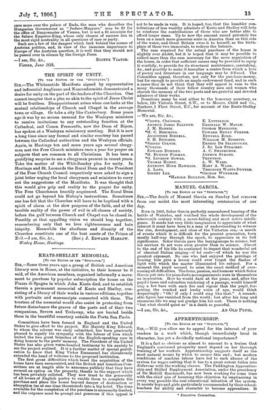KEATS-SHELLEY MEMORIAL.
LTo THE EDITOR OF THE "SPECTATOR.".1 Si,—Some three years ago a group of British and American literary men in Rome, at the initiative, to their honour be it said, of the American members, organised informally a move- ment to purchase by popular subscription the house on the Piazza di Spagna in which John Keats died, and to establish therein a permanent memorial of Keats and Shelley, con- sisting of a library of their works in various editions, together with portraits and manuscripts connected with them. The trustees of the memorial would also assist in protecting from future disturbance the graves of the poets and of their two companions, Severn and Trelawny, who are buried beside them in the beautiful cemetery outside the Ports San Paolo.
Committees have been formed in England and the United States to give effect to the project. His Majesty King Edward, to whom the scheme was early submitted, has been graciously pleased to signify his sympathy with the labour of love which united the two great branches of the English-speaking race in doing honour to the poets' memory. The President of the United States has also given warm-hearted testimony to his anxiety to see the project realised. It is a further matter of special gratifi- cation to know that King Victor Emmanuel has chivalrously extended the band of welcome to the proposed institution. The first great difficulties which beset the acquisition of the house have been surmounted, and the British and American Com- mittees are at length able to announce publicly that they have secured an option on the property, thanks to the support which has been privately enlisted. They now trust to the generosity of all lovers of English poetry to enable them to complete the purchase and place the house beyond danger of destruction or absorption (as at one time threatened) into a big hotel. The time available for the completion of the purchase is necessarily limited, and the response must be prompt and generous if this appeal is not to be made in vain. It is hoped, too, that the humbler con- tributions of less wealthy admirers of Keats and Shelley will help to reinforce the contributions of those who are better able to afford larger sums. Up to now the amount raised privately has been on a much more generous scale in America than on this side of the water, and Great Britain owes it to herself, as the birth- place of these two immortals, to redress the balance. The sum required for the actual purchase of the house is slightly over 44,000, but it is hoped that it may be possible to collect more than the sum necessary for the mere acquisition of the house, in order that sufficient means may be provided to equip it worthily, to provide for its structural maintenance, caretaking, &c., and possibly to make it hereafter a centre from which a love of poetry and literature in our language may be diffused. The Committee appeal, therefore, not only for the purchase-money, but for enough to provide an ample endowment fund, and in such a cause they do not think that they will appeal in vain to the many thousands of their fellow country men and women who cherish the memory of the two poets and are grateful and devoted admirers of their works.
Donations many be sent either to the honorary secretary, as below, 120 Victoria Street, S.W., or to Messrs. Child and Co., Bankers, 1 Fleet Street, B.C., for account of the Keats-Shelley Memorial.
—We are, Sir, &c.,
*CREWE, Chairman. E. LYTTELTON.
ARTHUR JAMES BALFOUR. REGINALD W. MAcAm.
J. M. BARRIE. GEORGE MEREDITH.
H. C. BEECHING. EDWARD HENRY PEMBER.
AUGUSTINE BIRRELL. RENNELL RODD.
S. H. BUTCHER. WILLIAM M. Rossrm.
*SIDNEY COLvIN. ERNEST DR SELINCOURT.
*CuRzON. J. ST. LOB STRACHEY.
EDWARD DOWDEN. A. C. SwINDURNE.
*H. BUXTON FORMAN. ARTHUR SYMONS.
LEYEBON GowER. TRNNysON.
THOMAS HARDY. A. W. WARD.
ANTHONy HOPE HAwHINs. MARY A. WARD.
A. LANG. THEODORE WATTB-DUNTON.
SIDNEY LEE. *GEORGE WYNDHAM.
*HAROLD Bouvrow, Hon. See.


















































 Previous page
Previous page